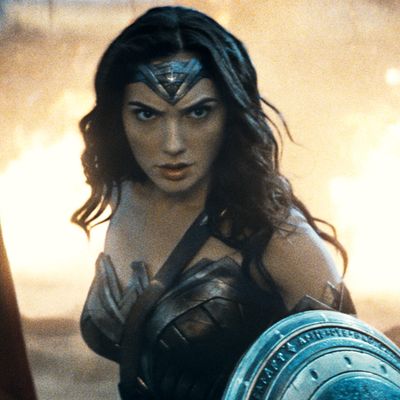
With Suicide Squad only three weeks away, anticipation is mounting in DC Land, where the hope is that David Ayer’s supervillain-centric sensory overload can win back some of the superhero-cinema ground lost by the Very Serious Grimacing of Batman v Superman: Dawn of Justice. While Kyle Buchanan’s trip to the set of Justice League last month revealed a Zack Snyder who was, if not contrite, at least aware of the need to let some light in, another development in the Not-Marvel comic universe reveals that there could be an even more aggressive course correction taking place. Today, Warner Bros. announced that the screenplay for Wonder Woman, the Gal Gadot–starring, Patty Jenkins–helmed standalone pic, is being attributed to Allan Heinberg and Geoff Johns, with Heinberg and Snyder receiving credit for the story. This is noteworthy for a few reasons:
1. There was reportedly a writer scrum.
More than a year ago, THR reported that WB hired five different writers to essentially compete for the job of penning the Wonder Woman script. This is not how screenplays are typically commissioned — while many studios have been convening rooms to handle their big-budget tentpoles, those writers work together, not in a Royal Rumble for the sole gig. Naturally, it rubbed a lot of industry folks the wrong way, particularly considering how sure-handed Marvel Studios tends to be with its hiring of writers and directors to work under undisputed CU mastermind Kevin Feige. Supposedly Jason Fuchs, whose previous work includes Pan and Ice Age: Continental Drift, had been hired to write the script, but that was reported by THR before news about the horse race emerged, when Michelle McLaren was still slated to direct. Considering the turnover, it’s unsurprising that Fuchs ended up on the outside looking in.
2. Geoff Johns is ascendant.
He has been the chief creative officer of DC since 2010, and he’s responsible for spearheading their successful expansion into TV with Arrow and The Flash. Before that, he was primarily a comics writer; Vulture’s Abraham Riesman wrote that “he revered the smiling, benevolent heroes of the mid-century and largely eschewed the gritty bloodletting that had been in vogue since the ‘80s. In series like Justice Society of America and The Flash, he cranked out stories that managed to be sun-dappled without being sappy.”
In May, during the aftermath of BvS-gate, Warner Bros. rearranged the deck chairs to create DC Films. Johns ascended to the head of the newly formed division alongside Jon Berg, an executive VP who’d already been involved with the bulk of DC’s movies and, importantly, also worked with Ben Affleck on his non-Batman projects, including Best Picture–winner Argo and Affleck’s next directorial effort, the Dennis Lehane adaptation Live By Night. Johns was already co-writing the standalone Batman movie with Affleck, and he’d been an executive producer on BvS; his promotion made him a producer on Justice League as well.
3. Allan Heinberg has been here the whole time.
On the one hand, Heinberg might seem like an unusual fit: He’s a longtime TV writer who’s worked on Party of Five, Sex and the City, Gilmore Girls, The O.C., Grey’s Anatomy, Scandal, and The Catch. On the other, he’s written comics, including the Young Avengers series for Marvel, which won press for featuring a pair of gay characters, and he’s worked with Johns before, on five issues of JLA. Most interesting (and relevant), he was an executive producer on the CW’s never-produced Wonder Woman show, Amazon, which is a very complicated title to Google.
But wait!, you say, pulling out your magnifying glass and dressing in your finest Sherlock cosplay — didn’t news of Johns’s fancy new movies position only come out May 17? And didn’t production on Wonder Woman wrap May 10?
Yes and yes, which is why the screenplay attribution is so interesting. Because Johns isn’t credited with the story, it’s safe to assume that he probably came on at a later point, whether that was prior to or during principal photography, which began in November of 2015 — well before Batman v Superman’s March release. (The way credit is issued for WGA scripts can be an opaque and byzantine process, and often writers make significant contributions to a final shooting script without receiving any credit at all.) That means it’s also safe to assume to assume that Johns’s influence over the DC cinematic universe has been on the rise for a while now, with Wonder Woman the first entry we can be certain bears his fingerprints. (As for Heinberg, he’s worked with Johns and DC before, and he’s worked with the character of Wonder Woman before, so that all makes sense.)
It takes a lot to make a stew, and stirring the DC stew these days are Snyder, Affleck, Johns, and Ayer, with plenty of others also involved. This is consistent with Warner Bros., which is known for being a filmmaker-driven studio, versus Disney, where the Mouse is king and Kevin Feige, as the stand-in for said Mouse, runs the show. But these are distinct creative minds, not just utility players combining to make a functional whole, and the order in which they’re being added risks the collision of visions and sensibilities. At the risk of mixing metaphors, it’s worth wondering whether DC is building a Warriors-esque super-team, primed to take back the game after a recent stumble, or if these guys are going to be more like the Lakers circa 2012.
And for what it’s worth: Yeah, Warner Bros. got a woman to direct Wonder Woman, but it was still written by a bunch of dudes.

